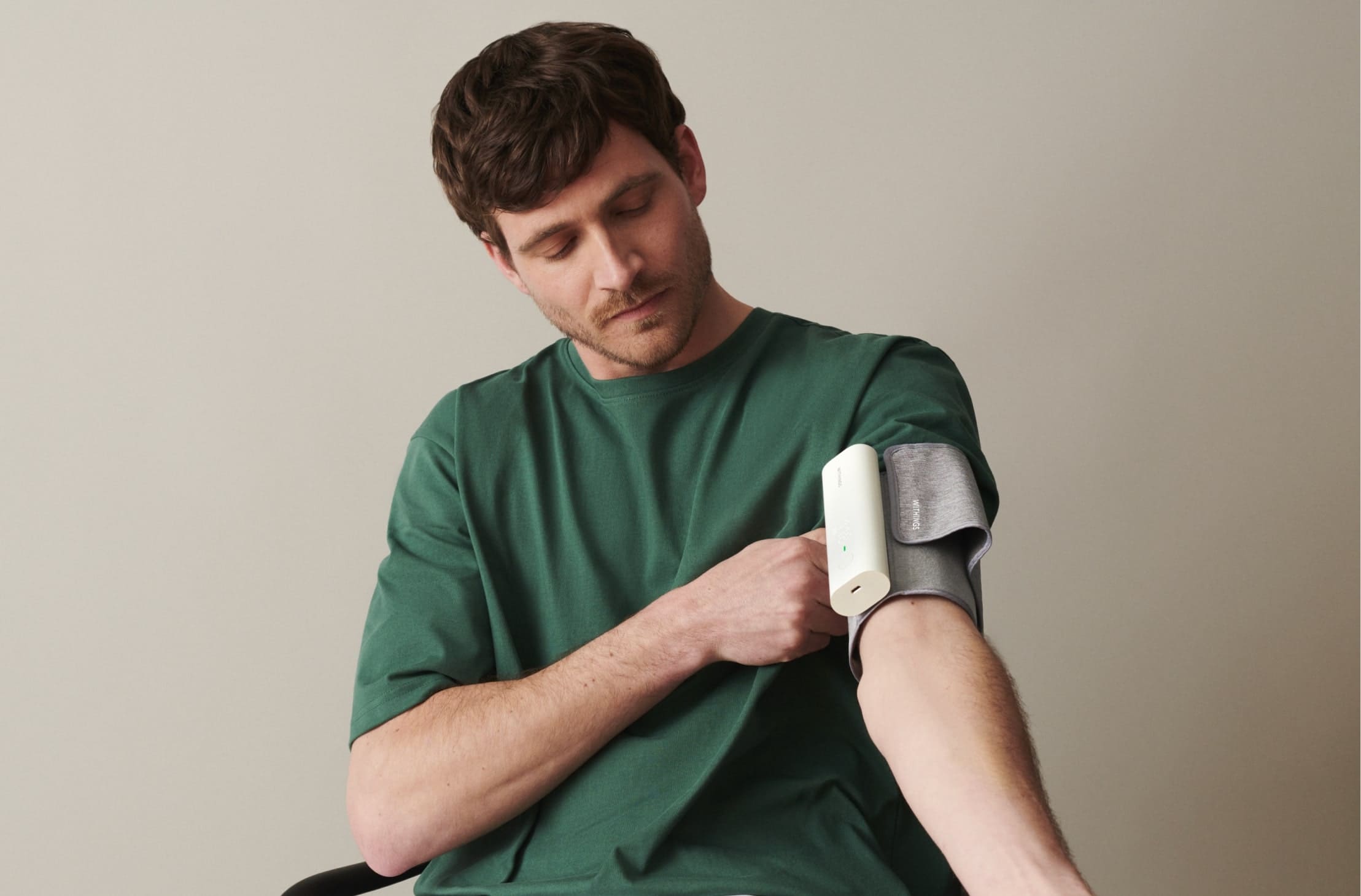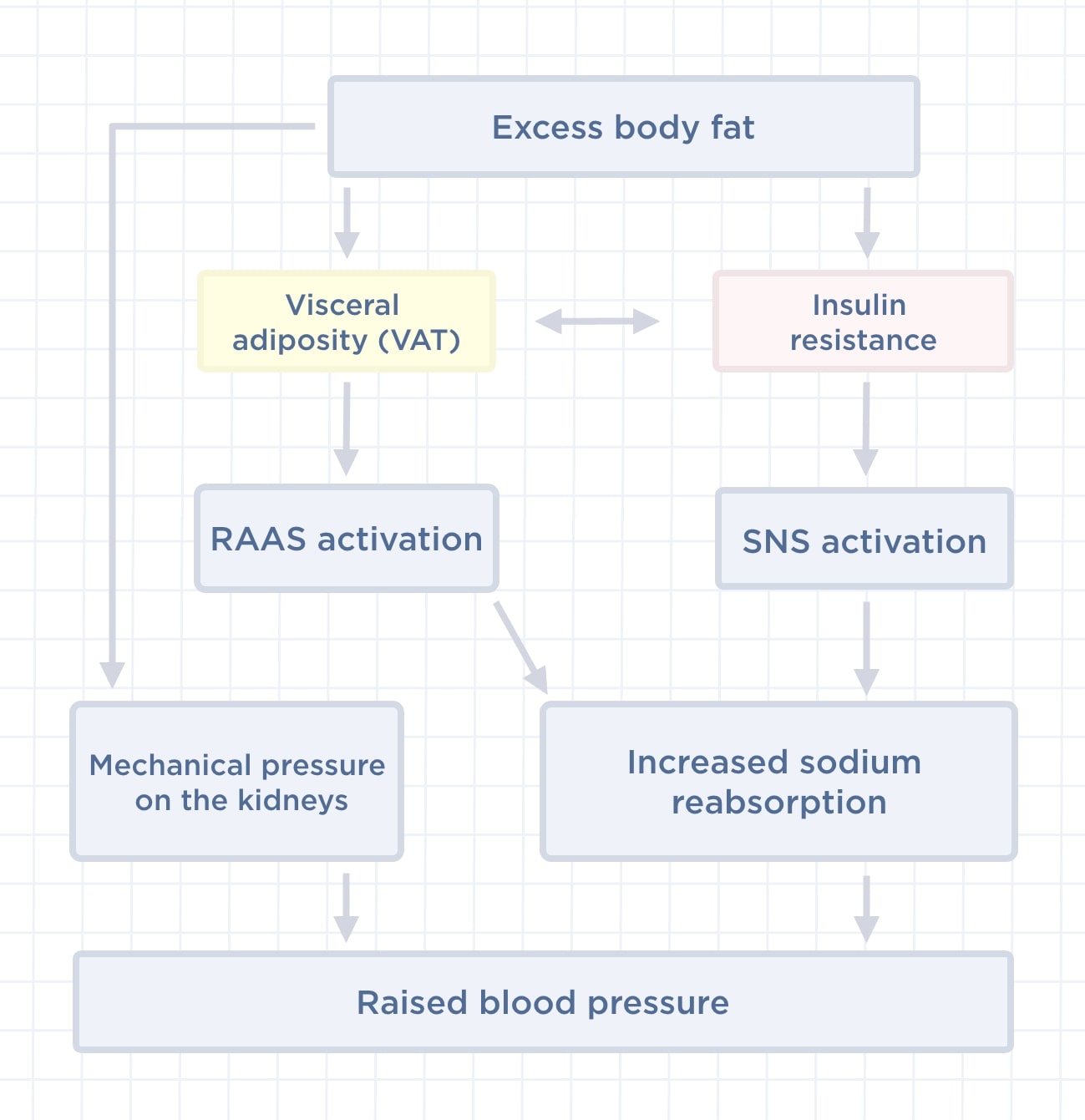
什么是BMI?了解男性和女性的正常体重指数
什么是BMI?身体质量指数有助于判断您是体重过轻、正常体重还是超重。了解BMI如何适用于男性和女性。
高血压是众所周知的心血管风险因素。由于缺乏症状,它有时难以预防,并且常常与超重有关。通常情况下,如果体重增加,血压也会随之升高。

您的心脏是一个惊人的器官,每分钟泵送五夸脱的血液,每天最多可达2,000加仑。您可能知道,心血管疾病是全球首要的死亡原因。“每年估计有1790万人因此丧生。”
您可能听说过生活方式的改变会对心血管疾病风险产生巨大影响。但让我们更仔细地看看心脏健康和体重,具体来说,看看减掉多余的体重如何有助于降低血压。
“护士健康研究”将BMI小于22的女性与BMI超过29的女性进行比较,发现肥胖者的高血压患病率高出2到6倍。
来源:减重与血压控制《AHA Journals, 2008》
早在1923年,健康男性和女性的血压“”,Dr. Brandreth Symonds 建立了体重与高血压之间的关联。
如今,体重和血压是一个重大的公共健康问题,因为它们可能对超重者的心血管和肾脏系统产生重大影响。
了解更多关于促进超重人群血压升高的病理生理机制。
高血压,即高血压症,是指当您的血压——或“血液对血管的推动力——太高了。“血压达到130/80或更高”被认为是高血压,血压在120-129且超过80被视为升高,这意味着您有发展为高血压的风险。
2018年,美国心脏病学会和美国心脏协会更改了他们的血压指南,取消了“高血压前期”类别,并降低了高血压的定义。
美国疾病控制与预防中心(CDC)将成人超重和肥胖定义为“体重高于某一身高所认为的健康体重。”
对于20岁或以上的成年人来说,如果其体重指数(BMI)在25到29.9之间,则被认为是超重;如果BMI达到30或以上,则被认为是肥胖。虽然BMI在衡量体重方面可能并不能说明全部情况,但它被广泛用作判断超重和肥胖的标准。
当谈到超重时,我们通常指的是过多的体脂。虽然并非所有肥胖者都会患上高血压,但科学证据表明,有多种病理生理机制导致肥胖引发的高血压。

交感神经系统(或SNS)是一个神经网络,通过电信号调整外周动脉的直径,使大脑能够控制血压。在肥胖人群中,脂肪细胞和胰岛素抵抗往往会刺激这种交感反应。
交感神经系统的激活被认为在肥胖相关性高血压的发病机制中具有重要作用。
来源: ''肥胖引发高血压的机制《Hypertension Research, 2010》
过多的内脏脂肪——储存在腹部周围的脂肪——可能导致肾脏的异常压迫,甚至可能引发肾损伤,并可能进一步恶化。异常的肾功能与增加的肾小管钠重吸收有关,在引发与肥胖相关的高血压中起着关键作用。"
来源: ''肥胖、肾功能障碍与高血压:机制性关联《Nature Reviews Nephrology》,2019
这些脂肪细胞组织会分泌许多激素。在肾脏中,它们可能会干扰负责钠(盐)平衡的肾素-血管紧张素-醛固酮系统(或称RAAS)。因此,肾脏必须维持较高的血压以排出每日摄入的盐分。
VAT积累与高血压的关联可能受到多个因素的影响,包括年龄、性别、肥胖程度和葡萄糖耐量状态;这些因素中的每一个都已被证明与腹部肥胖和高血压有关。
来源:高血压中的内脏脂肪:对胰岛素抵抗和β细胞功能的影响《Hypertension, 2004》
当您超重或肥胖时,额外的脂肪也会增加血管阻力“,以及心脏为泵血所需的工作。这种额外的活动给心脏带来了额外的压力,并导致血压升高。”
额外的体重可能会加剧其他风险因素,例如高胆固醇和胰岛素抵抗,这些都会影响心脏健康。胰岛素抵抗是一个特别隐蔽的循环——你脂肪越多,胰岛素抵抗就越严重,导致你分泌更多的胰岛素,从而储存更多的脂肪。所以血压和糖尿病“也已关联。”
医学研究正在进行,以调查过多体脂与高血压之间的许多其他可能关系。
美国疾病控制与预防中心(CDC)也表示,肥胖会增加心脏病和中风的风险——这是美国的主要死亡原因之一——并且常被称为“无声杀手”,因为它可能没有任何症状。肥胖的时间越长“影响可能会更严重,并且可能会出现更多并发症。”
“心力衰竭”
这种严重的并发症是指心脏无法泵送足够的血液来为身体器官提供足够的氧气。血管越狭窄,心脏的工作负担就越重,心力衰竭的风险也就越大。
“心房颤动”
高血压可能导致心脏左心房的扩大,从而导致异常收缩。由此产生的脉搏紊乱被称为心律失常。此外,“肾素-血管紧张素-醛固酮系统(RAAS)“正如在肥胖引起的高血压患者中所见,这也可能导致AFib。”阅读关于AFib +的信息
冠状动脉疾病
如果高血压不加以治疗,动脉壁上的压力积累会使它们更容易受损。这被称为动脉硬化,当动脉变窄并促进斑块积累时就会发生。冠状动脉疾病发生在供应心脏血液的动脉被阻塞时。
心脏瓣膜病
2019年发表在《European Heart Journal》上的一项研究表明,随着BMI和脂肪量的增加,主动脉瓣狭窄的风险也会增加。“这是一种病症,其中控制血液流向主动脉的瓣膜无法完全打开。”
“治疗抵抗”
欧洲肥胖研究协会和欧洲高血压学会联合声明指出,“肥胖患者容易患动脉高血压。“需要更多药物,并且有更高的风险变得对治疗产生抗药性。”
缺血性中风
高血压是中风的主要原因之一,尤其是如果它是与肥胖相关确实,过多的脂肪组织会引发反应和炎症,从而增强颗粒物的附着,导致(已经脆弱的)大脑动脉中形成血栓。如果大脑不再有足够的富氧血液灌溉,脑细胞将开始死亡。
肾衰竭
根据《“美国心脏协会”“肾单位由密集的血管网络供血,大量血液流经其中。长期以来,不受控制的高血压可能导致肾脏周围的动脉变窄、变弱或硬化。”肥胖也是慢性肾病(CKD)的已知风险因素。
专家们明确表示:“减重对于降低高血压至关重要。。
在《Circulation》的一篇文章中,研究人员指出:“虽然尚不完全清楚单靠减重在多大程度上能有效控制或预防轻度高血压,但控制肥胖应成为任何治疗或预防高血压方案的内在组成部分。”
在《家庭医学杂志》上的另一篇文章中,作者指出,通过改变饮食减重4公斤可使收缩压降低4.5毫米汞柱,舒张压降低3.2毫米汞柱。此外,他们还指出,减重1至1.2公斤可能会导致收缩压或舒张压的小幅下降。
如果您对体重感到担忧,请咨询医生以制定适合您的体重目标。
许多专家建议设置SMART目标—具体的、可衡量的、可实现的、相关的和有时间限制的目标—以实现长期的减重。您也可以考虑过程目标,例如每天走10,000步,而不是减掉一定数量的磅。此外,考虑“身体成分——您的脂肪、水分和骨量百分比。

示例:在设定SMART体重目标时合理的减重成就。
在Withings与巴黎乔治·蓬皮杜医院合作进行的一项研究中,研究人员发现,男性的BMI每月减少1.0 kg/m2,血压会下降1.79 mmHg;女性的BMI每月减少1.0 kg/m2,血压会下降1.81 mmHg。
另一项研究于2012年发表在《Obesity Research》上。建议逐步和适度地减重“,定义为您基线体重的5%到10%。”
根据研究人员的说法,这种程度的减重“即使没有达到理想体重,也可以使血压水平正常化”,并且已被证明能够降低甚至停止使用降压药物。
研究人员表示,血压降低可能是由于胰岛素敏感性增加和交感神经系统活动减少所致。
英国血压协会还表示,“您不必达到理想的BMI即可看到效果。”
如果您正在努力控制血压,改变饮食和锻炼习惯可以带来显著的效果。美国国家心肺血液研究所发布了包括以下内容的指南:生活方式调整帮助预防和治疗高血压。其中包括:减肥(每减掉20磅,收缩压可降低5-20个点),以及食用低脂肪且富含水果和蔬菜的饮食。
在《家庭医学杂志》发表的一篇文章中,研究人员对8项随机对照试验进行了荟萃分析,总共涉及2000名患者。他们发现“通过饮食改变实现的减肥降低了高血压患者的血压。。
首先,重要的是要知道在怀孕期间体重增加是必要的,如果您对体重有担忧,最好咨询您的医生。
怀孕期间的高血压可能是危险的。它可能导致胎盘的血流减少、胎盘早剥(即胎盘在分娩前从子宫内壁分离)、早产和心血管疾病。“除其他风险外”。
有各种类型的妊娠期间可能发生的高血压“,包括妊娠期高血压、慢性高血压和子痫前期,这是一种与10-15%孕产妇死亡相关的危险状况。”
怀孕期间的超重可能在高血压的发展中起到一定作用。2019年发表在《Revista de Saúde Pública》上的一项研究发现,体重增加过多的孕妇在第三孕期开始时,与体重增加适宜或不足的女性相比,平均收缩压较高。
如果您在怀孕期间超重或肥胖并且有高血压,该怎么办?2019年发表在《Hypertension and Metabolic Syndrome》上的一项研究建议,以较低的BMI进入怀孕期,避免体重增加,并服用低剂量阿司匹林。
研究人员建议“家庭血压监测也可能会有所帮助。
如果您担心血压和肥胖问题,请注意,通过生活方式的改变,有方法可以控制血压,甚至降低血压。通过设定现实的体重目标和增加活动量来降低血压,以达到健康体重。即使是适度增加步行量也可能有所帮助。不要放弃,继续努力!
通过注册获得首次订单优惠
By registering, you agree to receive advertising e-mails from Withings. However, if you change your mind, you can unsubscribe at any time. *The discount is valid for any purchase (except BeamO and U-Scan Nutrio) of at least €100 for 30 days after reception of the code. Only valid on withings.com, and while supplies last. This offer is only valid for first-time purchases. These offers cannot be combined.